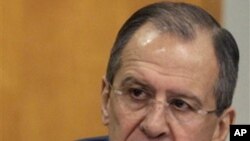Syrian President Bashar al-Assad spoke again to his people today in what appears to have been his latest effort to quell protests that have been plaguing his country since mid-March.
While much of the outside world agrees that anti-government sentiments are fueling the demonstrations, Assad’s regime maintains that it is dealing with armed gangs and terrorists, and that a foreign plot to topple his government is to blame for the turmoil.
In his speech today before a pro-Assad crowd at Damascus University, the Syrian leader pointed his finger at “saboteurs” and “foreign conspirators” as responsible for the uprisings and said he would not negotiate as long as there is unrest in the streets.
He said his regime will consider reforms, but offered no sign that he would step down.
Russian Reaction
Reactions to the speech varied, with Russian Foreign Minister Sergei Lavrov saying that Moscow would urge the Syrian opposition to negotiate with Assad’s government.
Speaking in Belarus, Lavrov criticized some members of the Syrian opposition for trying to provoke international intervention in Syria similar to NATO’s campaign in Libya.
"As far as I can judge, including from my recent phone conversation with [U.S. Secretary of State] Hillary Clinton, there is a common understanding about the inadmissibility of playing up to those who want to provoke a situation like in Libya,” the Russian foreign minister said.
“Russia will do all it can in order to prevent the situation in Syria descending into a scenario similar to Libya,” Lavrov added.
Israeli Reaction
Meanwhile, Israeli Defense Minister Ehud Barak - speaking at the Paris Air Show - said that he believes Assad’s days are numbered and that he has used too much force to have any hope of remaining president.
"We do not pretend to have any role in the internal issues of Syria, that is up to Syrians but my personal judgment is that Bashar al-Assad crossed the point of no return towards his demise,” he said.
“He probably will stay there for another quarter or two but that will not change his fate. He ended up using too much brutal force, too much graves have been dug in Syria and he lost practically his legitimacy in the eyes of his own people," Barak added.
EU Reaction
The European Union issued a statement condemning the continued violence in Syria, and threatening further sanctions. The EU statement repeated assertions that a “credible, genuine and inclusive” dialogue offers the only way out in Syria. Still, the EU did not announce any new penalties nor did it call for Assad to step down.
Local Reaction
Syrian opposition figures have denounced the speech, saying Assad was only talking to his supporters, not to the opposition or the international community.
The Local Coordination Committee of Syria also posted a map where anti-government protests were taking place. Amateur video from the region showed protesters in the streets chanting anti-government slogans.
Rights activists say that nationwide more than 1,400 civilians have been killed and 10,000 detained since the crackdown on protests began.
Reactions Varied to Syrian Speech and Actions
- By David Byrd




